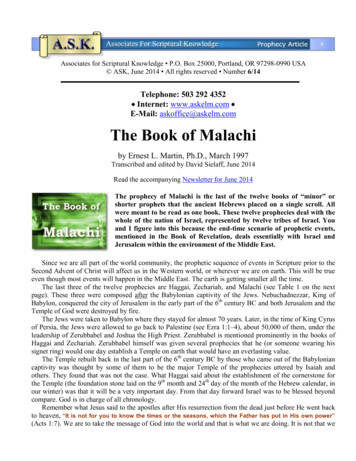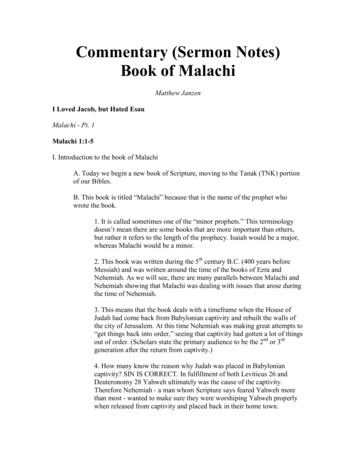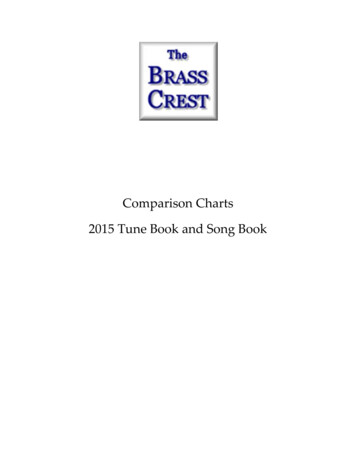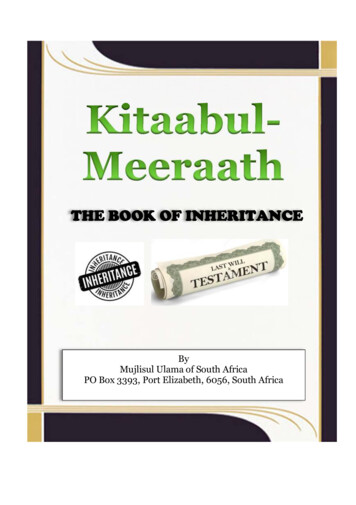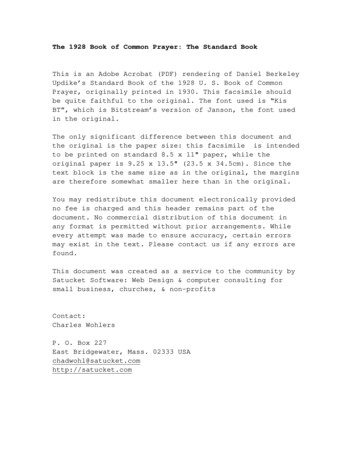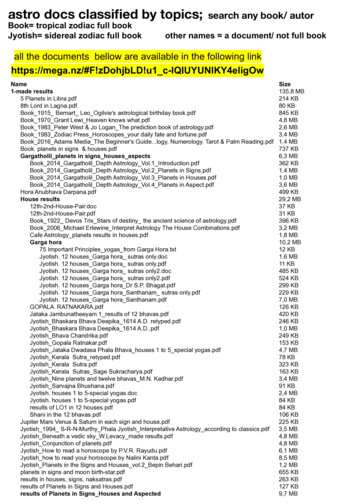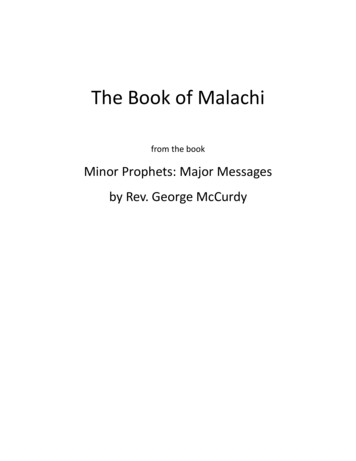
Transcription
The Book of Malachifrom the bookMinor Prophets: Major Messagesby Rev. George McCurdy
ContentsHow to Use This Study Guide. 4Introduction. 5Malachi's background. 5Approximate Dates. 6The message of Malachi, the “Lord’s Messenger”.6The unique style of Malachi’s prophecy. 7Chapter One. 10Malachi 1:1-2. 10Malachi 1:3-4 (a). 14Malachi 1: 4 (b) -6. 17Malachi 1:7-8. 23Malachi 1:9-10. 27Malachi 1:11. 29Malachi 1:12-14. 36Chapter Two. 40Malachi 2:1-4. 40Malachi 2:5-7. 46Malachi 2:8-10. 51Malachi 2:11. 54Malachi 2:12. 58Malachi 2:13. 60Malachi 2:14-16. 622
Malachi 2:17. 67Chapter Three. 71Malachi 3:1-3. 71Malachi 3:4. 77Malachi 3:5-6. 82Malachi 3:7. 88Malachi 3:8-9. 90Malachi 3:10-12. 93Malachi 3:13-15. 98Malachi 3:16-18. 102Chapter Four. 106Malachi 4:1-3. 106Malachi 4:4. 111Malachi 4:5-6. 114Epilogue: A Summary of the Book of Malachi.119Chapter One. 119Chapter Two. 119Chapter Three. 120Chapter Four. 1203
How to Use This Study Guide1. A careful, unhurried reading of Malachi is essential. Reading the chapterbefore looking at the notes, while working with the notes, and after finishingwith the notes will give each researcher a powerful sense of the series ofmeanings within each chapter. It is important to be comfortable with all thenames and places in the prophecy and to understand the announcements theprophet makes on behalf of the Lord. When possible, historical informationwill be included in the notes to increase reading comprehension and enhanceapplication.2. 2.Our study of each chapter of Malachi will begin with quotes from a work ofthe Writings called Summary Exposition of the Prophets and Psalms (P&P).This work includes a verse-by-verse overview of all four chapters of Malachithat provides general information about the internal sense. Our research willhelp move us from the generals to the particulars of the internal sense.3. Another important reference tool is Searle’s General Index to Swedenborg’sScripture Quotations. This reference is used to find passages in the Writingswhere a verse(s) from the Word is either explained specifically or used toillustrate a doctrinal point that we can use in our study. There is also anotheruse of this work. As we study, each researcher will be led by the Lord’sProvidence in myriad ways, according to specific needs or states. Knowinghow to use this book will help each of us to explore relevant topics and lookup related passages to increase our knowledge of the three-fold Word.4. You will soon discover that not every verse, word, name, etc. is directlyquoted in the Writings. But there are often other references to the samename, place, or thing in the explanation of a different verse of the Word. Thehope is that reflection on these other doctrinal explanations will help us seepossible applications to our study of Malachi. We will need to use “deriveddoctrine” often. Please don’t run away from this maligned term. If we use itproperly and admit openly that it is derived doctrine, we bring no harm to theinternal sense.5. Keep some kind of notebook handy during your study times. Write outinsights, questions, and any summaries you find helpful in organizing yourthoughts about each chapter. The goal of this study guide is not to give adetailed summary of the internal sense but to start each researcher’s questfor deeper insight.6. At the end of each chapter in the study guide, you will find a study review.The review includes a summary of each section to help you reinforce andbuild on your understanding of several of the key points.7. Begin each study unit with a devotional prayer asking the Lord to guide anddirect your thoughts. Certainly, beginning in this sphere has the power toinspire and open our minds with a higher spiritual priority that will keep usin the company of the Lord’s angels. As the Writings teach, we must seek tolove truth for truth’s sake. Such an approach will free each reader from4
preconceived ideas that might limit his or her ability to “see” the intent andmessage of the Lord’s Word.IntroductionWelcome to the study of Malachi. Malachi is the last book of the twelve MinorProphets and the last book in the Old Testament. Malachi’s prophecy was followedby a period of four to five hundred years of prophetic silence before the Lord’sadvent occurred.This introduction will focus on the examination of the following points:1. Malachi’s background.2. The approximate dates of his life and prophecy.3. The message of Malachi, the “Lord’s Messenger.”4. The unique style of Malachi’s prophecy.MALACHI'S BACKGROUND" No one knows who the author of the book was; the name “Malachi” is simply atransliteration of the Hebrew word meaning ‘My Messenger.’ Nor can anyone becertain as to when the author lived, although modern scholarship tends to give muchcredence to the ancient tradition to the effect that he lived sometime about 400 or350. (There are still authorities who would date Malachi much later than this; andthere are others who would date him as early as the eighth century.)” Pre-AdventChurches, by Ormond Odhner, page 308.I cite this statement because there has been considerable scholarly debate as towhether or not “Malachi” is a proper name or a common noun. If it is a noun, thenthis book is by an anonymous writer who refers to himself as “My messenger” or the“Messenger of Jehovah.”The following background information about Malachi and his prophecy is derivedfrom a series of online essays on “The Minor Prophets” authored by Al Maxey. Theessay on Malachi is available at http://www.zianet.com/maxey/Proph13.htm.The LXX (Septuagint) treats the word “Malachi” as a noun rather than as a propername. The Targum of Jonathan ben Uzziel (an Aramaic paraphrase of the propheticbooks dating from the 4th or 5th century AD) includes this phrase: “ My messengerwho is Ezra the scribe.” Josephus, when describing the major characters of theperiod, fails to mention Malachi among them. Even where Malachi is quoted in the5
New Testament (Matthew 11:10; Mark 1:2; Luke 7:27 ), his name is not mentioned inthe citations. Is the omission of Malachi’s name of spiritual significance?Some scholars think Ezra was the author of Malachi. Others believe Malachioriginally was part of the prophetic book of Zechariah but was made into a separatebook to make the Minor Prophets amount to the sacred number 12. So much morecould be pulled into this quest to know about Malachi’s background but to whatend?APPROXIMATE DATESIf “Malachi” is a name and not a noun, it is possible to identify a general date whenthis work was written by noting the history of Israel’s exile and the rebuilding of thetemple. The Babylonian captivity of the Jews ended in 536 BC when Cyrus allowedthe Israelites to return to their homeland. With the leadership of Haggai andZechariah, the people rebuilt the temple. The dates of this happening are between520 and 516 BC. Malachi, Ezra, and Nehemiah wrote about the same sad anddeteriorating spiritual conditions within the temple and among its priests. WasMalachi a contemporary of Ezra and Nehemiah? If so, the book of Malachi mighthave been written in the period of 445 to 425 BC.But eventually, we probably will agree with Ormond Odhner: “No one knows whothe author of the book was nor can anyone be certain as to when the author lived ”So if we don’t know who the author was, how can we pinpoint a date? This issomething we have had to face with many of the Minor Prophets. Our New Churchperspective teaches us that we are not to focus on the person who wrote theprophetic book. Instead, we are to concentrate on the contents of the spiritual senseof the Word. Given the choice, what would we consider most profitable in the studyof this book of the Word: knowing about the man who wrote it or knowing thespiritual sense of this prophecy in the Word?THE MESSAGE OF MALACHI, THE “LORD’S MESSENGER”The message of Malachi calls the hearer to consider the Lord’s providential care inbringing about the great release from Babylonian captivity. He reminds his listenersthat the temple had been rebuilt, the walls of the city fortified again, and thesacrificial system reinstituted. They had a degree of security from foreignaggression. But their enthusiasm for worship had been replaced by mechanical,ritualistic practice that was far from spiritual. Other gods slipped into the serviceswithin the temple. The worshippers’ hearts were not with the Lord but withthemselves. Relationships with the Lord and with one another were falling apart.Malachi sought to turn the people’s enthusiasm to doing what was pleasing to theLord. To do this, he had to speak hard words about the lapses within the priesthood6
and the temple. Malachi called for the priests and the people to hear and behold theerror of their ways: The priests were not providing moral and spiritual leadership. They werecontemptuous in discharging their duties. Their gifts to the Lord were lame,blind, and sick. Instead of giving their best to th
If “Malachi” is a name and not a noun, it is possible to identify a general date when this work was written by noting the history of Israel’s exile and the rebuilding of the temple. The Babylonian captivity of the Jews ended in 536 BC when Cyrus allowed the Israelites to return to their homeland. With the leadership of Haggai and Zechariah, the people rebuilt the temple. The dates of .
